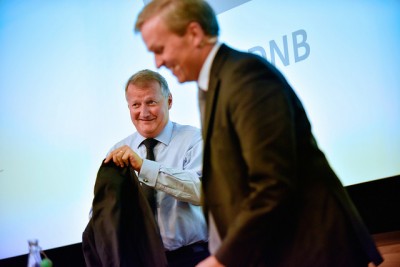The chief executive of Norway’s biggest bank, DNB, claimed that he runs the “strongest bank in the world,” after reporting more record-high profits this week. CEO Rune Bjerke is, however, bracing for harder times ahead and thinks Norway’s economic downturn will extend at least until 2018.

“We see that growth is slowing, and that’s a sign that acceleration within the Norwegian economy has declined greatly,” Bjerke said. As newspaper Dagens Næringsliv (DN) reported on Friday, he’s not being blinded by the latest round of record results at DNB. He’s preparing for higher loan losses and lending out less.
“We see that the unemployment rate is rising,” Bjerke noted. He added that the rise “isn’t as high as one might think when you consider how strongly the brakes are being stepped on” within oil and gas investing, but like other banks, DNB is also braking within its lending activity.
“The bank is open, but we will spend our time with customers with whom we already have good relations,” Bjerke said.
Double-digit profit hikes
DNB reported double-digit increases in operating revenues (up 10.1 perent), operating profits (up 14.1 percent) and pre-tax profits (up 14.7 percent) at the end of the third quarter. Results were not nearly as good in its DNB Markets division where profits sunk in double digits, but it still contributed around NOK 4 billion in operating revenue and NOK 2 billion in profits.
DNB’s finance director, Bjørn Erik Næss, said that the bank’s management thinks the downturn in the oil and offshore sector will last longer than they thought just a few months ago. “While we earlier projected that markets would flatten out in 2017, we now think it won’t happen until a ways into 2018,” Næss said.
DNB is hardly lending at all to the most troubled sectors, reported DN, and Næss confirmed the bank is being more careful. “We haven’t locked the door and thrown away the key in some parts of the bank,” he said, “but lower loan growth reflects a higher degree of level-headedness, combined with a decline in loan demand, especially within oil and gas.”
That’s the area where DNB is bracing for more loan losses and “we don’t want to take on more risk within the vulnerable sectors than necessary,” Næss said. “Oil and offshore are still important sectors for the bank, and we will support customers who’ll face demanding times for a period ahead.”
Weaker krone helps, long-term oil outlook brighter
Bjerke joined other economists and politicians in noting that Norway’s weaker currency, the krone, and low interest rates will help offset reduced activity in parts of the bank. The krone was sagging again on Friday after several days of strengthening, with a US dollar costing NOK 8.30 Friday morning, up from just over NOK 8 earlier in the week. DNB’s lending growth rate, meanwhile, remains “weakly positive” among DNB’s biggest customers, and is running at 7 percent among small and medium-sized customers so far this year.
There were other signs this week that the downturn in Norway’s biggest industry, oil and gas, won’t last. DN also reported on Friday that a new analysis prepared in advance of the upcoming UN climate summit in Paris in December indicates that oil consumption in 2030 will be higher than it is today, even if politicians meet the UN’s goals of a two-degree rise in average global temperatures. The EU-financed report surprised oil analyst Thina Saltvedt at Nordea Markets, who noted that the International Energy Agency has predicted oil consumption will decline from 2020.
But the world will still need oil and gas, according to the report prepared by Paris-based research institute IDDRI in cooperation with 11 research institutions around the world. “This is in line with what I have said,” the head of Norway’s national oil and gas industry association Norsk olje og gass, Karl Eirik Schjøtt-Pedersen, told DN. Norwegian Oil Minister Tord Lien has also claimed repeatedly, as have other government politicians, that oil and gas will remain Norway’s most important industry for decades to come.
newsinenglish.no/Nina Berglund

